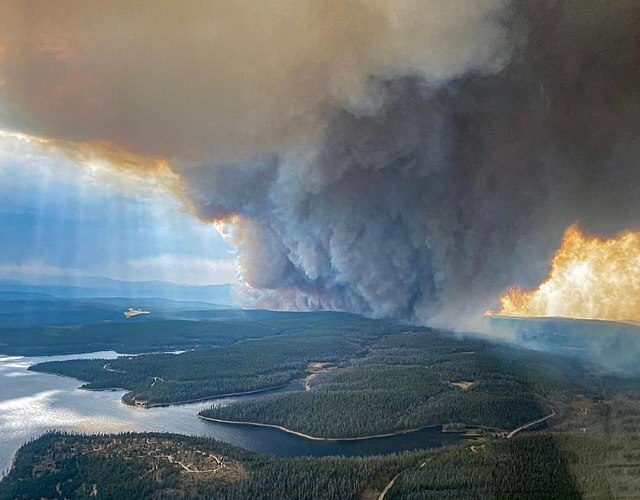Our world is ablaze. In a literal sense, some regions actively burn. Metaphorically, others face social and political fires. Susceptible regions experience many forms of concerning weather phenomena including flooding, extreme heat waves and pervasive droughts. Despite the need for urgent action, effective legislation to combat climate change is minimal in the United States. According to Human Rights Watch, the US Senate’s failure to pass the Build Back Better bill at the end of 2021, which contained significant climate-related legislation, “imperils [human] rights.” With so much at stake, this failure questions whether or not bipartisanship can exist under the current political system.
Legislative passivity stems from a variety of sources, with much of the blame on the structural framework of the US government. Structural holes in the US system, like the ability to revoke executive orders, highlight the fluidity of executive agreements between presidential administrations. To this point, in recent years, an oversized ego in the Oval Office pulled out of the Paris Climate Accords.
Due to a combination of the two-party system’s nature and the US government’s structure, individual representatives in the Senate hold an outsized amount of control, especially if a party holds the chamber by a thin margin. By 2040 nearly two-thirds of the country’s population will be represented by less than a third of the Senate. Stalling climate legislation demonstrates how much sway even one individual can have in their own party. Inaction on climate legislation remains catastrophic as experts continually emphasize that “the time for action is now.” However, long periods of inaction coupled with politicians limited by their ties to the coal industry, like Senator Joe Manchin, cause the situation to go from bad to worse. While Manchin might be in the spotlight, seven other Democrats sitting on key energy and environmental committees also have some form of connection to the fossil fuel industry, especially ExxonMobil and Duke Energy.
The greatest inhibitor to passing decisive climate legislation in the US lies in a structure unplanned by America’s framers: the two-party system. The existence of political parties was neither explicitly accounted for nor encouraged during the Constitutional Convention. In his farewell address, George Washington expressed his fears that “in place of the … will of the nation [,] the will of the party” would take over. However, it was already too late. The country’s first political parties, composed of the Federalists and Democratic-Republicans, already formed. Although neither of these original parties would last, the two-party system remained integral to the structure of future US politics.
Under the current system, voters are forced to choose between Republicans and Democrats, neither of which may necessarily represent their beliefs. Both parties have diverged since the early 1970s, recently culminating in unprecedented levels of political polarization. At the same time, many feel that they are not represented accurately by either of the current parties, and an increasing number of voting age adults are identifying as independents. Because the current system hinders the possibility of a strong third party, independent voters and politicians alike have limited political options. Bernie Sanders is an independent politician yet he operates in Democratic spaces.
One way to combat the pitfalls and subsequent polarization of a two-party system is to switch to a multiparty system. While the Constitution does not account for political parties, James Madison’s Federalist 10 suggests to “take in a greater variety of parties and interests.”
Switching to a multiparty system provides a variety of benefits. First, it allows voters to choose from a greater range of groups on the political spectrum. A multiparty system would allow a larger platform for already-established parties looking to combat climate change, like the Green Party. This party uses its smaller platform to call for greater action on climate change. They emphasize their support for the Green New Deal, which prioritizes America’s conversion to 100% renewable energy by 2030. Secondly, this system, through cooperation, could help reduce party polarization. It dispels the “taboo” surrounding compromise to pass legislation, allowing representatives to feel more pressure from their constituents rather than their party. Finally, it could influence voters themselves. A multiparty system could improve voter turnout, which historically has been low in the United States. There is also the possible secondary effect of passing legislation, including climate-related measures, that the majority of the public agrees with.
Transitioning to a multiparty system would be difficult. It would require eliminating political institutions, like the Electoral College, which is based on a plurality system and promotes the two-party system. The winner-takes-all nature of the Electoral College has made negative partisanship, which entails hating the other party rather than considering your party’s own merits, “the most consequential force in American politics.” The increasing polarization of the US contrasts greatly with other Western democracies, where parties on opposite sides of the spectrum are allying to combat climate change. However, the US runs on a presidential system, whereas many Western democracies, and particularly European ones, utilize parliamentary systems. Whether a presidential or parliamentary system, recent years have seen a rise of populism in Western countries, in part due to increasing polarization. The results of the Italian elections are the most recent example of this shift, with the far-right Brothers of Italy candidate, Giorgia Meloni, winning her bid for Prime Minister.
Once greatly criticized by scholars, stable multiparty presidential systems arose in the 1990s and early 2000s. The greatest concentration of multiparty systems can be found in Latin America, which shows the potential capacity for presidential, multiparty governments. Uruguay has a presidential system while maintaining long-lasting coalitions between multiple parties. Chile, in particular, is considered one of the most successful examples of multiparty presidentialism, scoring a ninety-four on the Freedom House Index. Additionally, it has a recent record promoting action on climate change; in 2022, this success also culminated when the country passed an extensive bill to combat climate change. In this bill, Chile pledged to reach “net zero emissions by 2050 at the latest,” The White House has also claimed it will achieve “a net-zero emissions economy” by 2050. However, while the Chilean bill is part of a binding goal, the White House’s promise is non-binding, and subject to the whims of the executive office. In contrast, Chile’s climate bill has been published, meaning it is a tedious process to repeal.
Though the outlook may seem bleak, making substantial revisions as to how government is conducted in the US would help us glimpse a light in the gloom. If we remain stuck in our current ways, because they are tradition, we cannot change, and without change we cannot move forward to a brighter and better world.



